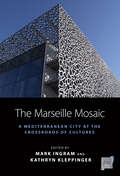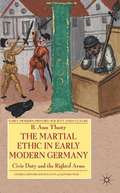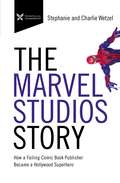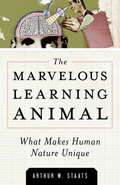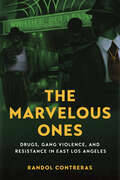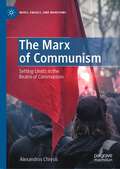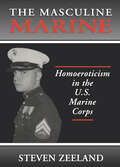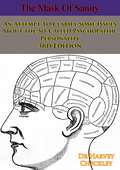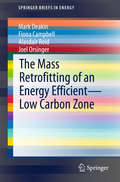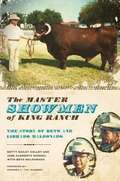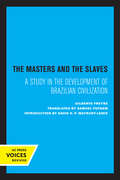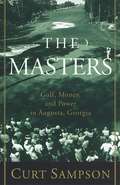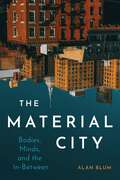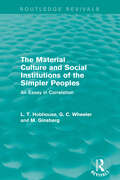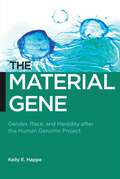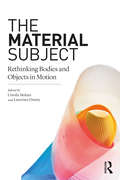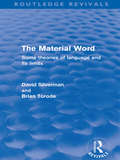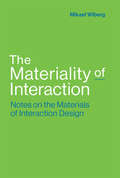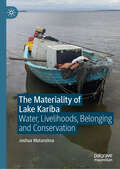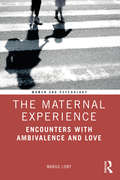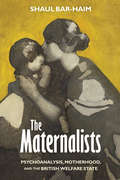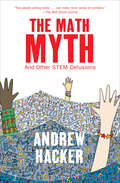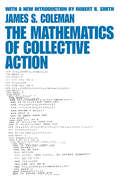- Table View
- List View
The Marseille Mosaic: A Mediterranean City at the Crossroads of Cultures (Space and Place #21)
by Mark Ingram and Kathryn KleppingerFormerly the gateway to the French empire, the city of Marseille exemplifies a postcolonial Europe reshaped by immigrants, refugees, and repatriates. The Marseille Mosaic addresses the city’s past and present, exploring the relationship between Marseille and the rest of France, Europe, and the Mediterranean. Proposing new models for the study of place by integrating approaches from the humanities and social sciences, this volume offers an idiosyncratic “mosaic,” which vividly details the challenges facing other French and European cities and the ways residents are developing alternative perspectives and charting new urban futures.
The Martial Ethic in Early Modern Germany
by B. Ann TlustyFor German townsmen, life during the sixteenth and seventeenth centuries was characterized by a culture of arms, with urban citizenry representing the armed power of the state. This book investigates how men were socialized to the martial ethic from all sides, and how masculine identity was confirmed with blades and guns.
The Martian's Daughter: A Memoir
by Marina Von Neumann WhitmanOne of the five Hungarian scientific geniuses dubbed "the Martians" by their colleagues, John von Neumann is often hailed as the greatest mathematician of the twentieth century and even as the greatest scientist after Einstein. He was a key figure in the Manhattan Project; the inventor of game theory; the pioneer developer of the modern stored-program electronic computer; and an adviser to the top echelons of the American military establishment. In The Martian's Daughter, Marina von Neumann Whitman reveals intimate details about the famed scientist and explores how the cosmopolitan environment in which she was immersed, the demanding expectations of her parents, and her own struggles to emerge from the shadow of a larger-than-life parent shaped her life and work. Unfortunately, von Neumann did not live to see his daughter rise to become the first or highest-ranking woman in a variety of arenas. Whitman became a noted academic during the 1960s and '70s, casting her teaching and writing in the framework of globalization before the word had been invented; became the first woman ever to serve on the President's Council of Economic Advisers and participated actively in U. S. efforts to reshape the international monetary and financial system during the early 1970s; pioneered the role of women on the boards of leading multinational corporations; and became the highest-ranking female executive in the American auto industry in the 1980s. In her memoir, Whitman quotes from personal letters from her father and describes her interactions with such figures as Roger Smith of GM and President Nixon. She also details the difficulties she encountered as an early entrant into a world dominated by men and how she overcame the obstacles to, in her words, "have it all. "
The Marvel Studios Story: How a Failing Comic Book Publisher Became a Hollywood Superhero (The Business Storybook Series)
by Charlie Wetzel Stephanie WetzelWhat can you learn from the world&’s most successful companies? Marvel characters have been shaping pop culture for decades and when comic books were no longer keeping the company afloat, Marvel Studios was born.Marvel Studios is the multibillion-dollar home to iconic franchises. They are known for creating brilliant multilayered worlds and storylines that allow their audiences to escape into a fantasy and inspire the creative side of every viewer. But, behind those visionaries is a well-oiled storytelling machine dedicated to getting the Hulk&’s smash fists in the hands of every child and a sea of Spiderman costumes deployed every Halloween.The Marvel Studios Story educates you on how one of the largest creative companies in the planetary universe runs their business and keeps their fans and their parent company, Disney, counting the profits. Through the story of Marvel Studios, you&’ll learn:How to recognize and pursue additional revenue streams.How a company can successfully balance the creative with business to appease investors and fans alike.And how to keep a decades-old superhero franchise new and exciting without losing sight of its roots.The Marvel Studios Story will help you understand and adopt the competitive strategies, workplace culture, and daily business practices that enabled a struggling comic book publisher to parlay the power of myth and storytelling to become one of history&’s most successful movie studios.
The Marvelous Learning Animal
by Arthur W. StaatsWhat makes us human? In recent decades, researchers have focused on innate tendencies and inherited traits as explanations for human behavior, especially in light of groundbreaking human genome research. The author thinks this trend is misleading. As he shows in great detail in this engaging, thought-provoking, and highly informative book, what makes our species unique is our marvelous ability to learn, which is an ability that no other primate possesses. In his exploration of human progress, the author reveals that the immensity of human learning has not been fully understood or examined. Evolution has endowed us with extremely versatile bodies and a brain comprised of one hundred billion neurons, which makes us especially suited for a wide range of sophisticated learning. Already in childhood, human beings begin learning complex repertoires--language, sports, value systems, music, science, rules of behavior, and many other aspects of culture. These repertoires build on one another in special ways, and our brains develop in response to the learning experiences we receive from those around us and from what we read and hear and see. When humans gather in society, the cumulative effect of building learning upon learning is enormous.The author presents a new way of understanding humanness--in the behavioral nature of the human body, in the unique human way of learning, in child development, in personality, and in abnormal behavior. With all this, and his years of basic and applied research, he develops a new theory of human evolution and a new vision of the human being. This book offers up a unified concept that not only provides new ways of understanding human behavior and solving human problems but also lays the foundations for opening new areas of science.
The Marvelous Ones: Drugs, Gang Violence, and Resistance in East Los Angeles
by Prof. Randol ContrerasAn intimate portrait of LA gang members turning to drugs, nostalgia, and religion as they age and fight to stay relevant in a new era. Once celebrated in the gang world as rebels who defied the established prison order, veterano Maravilla gang members now grapple with the consequences of leading violent and drug-ridden lives. At once thrilling and tender, The Marvelous Ones sheds light on how these aging gang members struggle to stay meaningful in the face of addiction, violent trauma, and a rapidly changing East Los Angeles. Randol Contreras spent close to a decade studying the legendary Maravilla gangs of East LA, who made waves in the 1990s for their rebellion against the most powerful prison gang in the United States: the Mexican Mafia, or La Eme. These men granted Contreras unique access to their experiences, revealing how family members shun them, how jail and prison worsen them, how the church and drug treatment redeem them, and how their brightest moments lie in their pasts as legends of the California gang world. The Marvelous Ones gives human faces to the suffering and resilience of some of the most marginalized members of our society.
The Marx of Communism: Setting Limits in the Realm of Communism (Marx, Engels, and Marxisms)
by Alexandros ChrysisFollowing Marx’s own itinerary from Paris to London, from politics to the critique of political economy, The Marx of Communism delves into a creatively unfolding international debate on the democracy-communism relation, while supporting a 21st century communism as a social alternative to capitalism. Taking into consideration Marx’s analysis of communism both as a movement and a social formation, this study focuses on the dialectics of transition from capitalism to communism. Dealing with communism as the outcome of a long-term cultural and political process, the author defends Marxian communism as the open-ended constitution of a self-governed demos, whose citizens create their own way of life on the ground of a stateless and classless society. From this point of view, the end of the state does not mean the end, but the revival of politics in terms of a communist bios. Reshaping their collective and personal values and setting limits to the production/technology dynamics of their economy, this book argues, the citizens of a communist polis form a promising antithesis to the private individuals of a capitalist society.
The Masculine Marine: Homoeroticism in the U.S. Marine Corps
by Steven ZeelandThis exciting book was listed as #1 on The Advocate’s (ital) bestseller list for December 1996! In The Masculine Marine, author Steven Zeeland records, for the first time ever, what active-duty Marines have to say about what it means to be a man, to be a Marine, and to desire other men. As the foremost surviving icon of traditional masculinity, Marines are often considered the opposite of “gay.” Yet in contemporary gay culture, Marines are stereotyped as likely to play the passive role in sexual encounters with other men. By vividly illustrating some of the startling ways in which gay and Marine attributes can coincide, The Masculine Marine uncovers the wild sexual contradictions built into military hypermasculinity. From ordinary grunts to a major who flies a combat jet, Zeeland’s Marine interviewees provide thoughtful and articulate insight into aspects of this rarely documented culture, including: homoerotic bonding among Marines how gay Marines reconcile their sexual identity with the ethos of “hard” Marine supermasculinity how some Marines eroticize the pain and humiliation of Marine Corps boot camp Marines in all-male pornography male attitudes toward women in the Marine Corps hazing and institutional violence These Marines talk candidly about what motivated them to join the United States’most elite fighting force, and they reveal how becoming Marines has shaped their sexual and gender identities. For the student of gay or military studies or anyone sexually intrigued by men in uniform, The Masculine Marine must reading. Visit Steven Zeeland at his home page: http://www.stevenzeeland.com
The Mask Of Sanity: An Attempt To Clarify Some Issues About the So-Called Psychopathic Personality 3rd Edition
by Dr Hervey M. CleckleyOriginally published in 1941 under the title Mask of Sanity: An Attempt to Clarify Some Issues About the So-Called Psychopathic Personality, this influential book became a landmark in psychiatric case studies and was repeatedly revised, expanded and reprinted in subsequent editions--here we present the 3rd edition published in 1955.The Mask of Sanity is distinguished by its central thesis that the psychopath exhibits normal function according to standard psychiatric criteria, yet privately engages in destructive behavior. The book was intended to assist with detection and diagnosis of the elusive psychopath for purposes of palliation and offered no cure for the condition itself. The idea of a master deceiver secretly possessed of no moral or ethical restraints, yet behaving in public with excellent function, electrified American society and led to heightened interest in both psychological introspection and the detection of hidden psychopaths in society at large, leading to a refinement of the word itself into what was perceived to be a less stigmatizing term, "sociopath".
The Mass Retrofitting of an Energy Efficient--Low Carbon Zone
by Mark Deakin Fiona Campbell Alasdair Reid Joel OrsingerMaximizing reader insights into the strategic value of mass retrofits in the residential property sector through a detailed case study analysis of the 'Hackbridge project', this book uses this development to broaden understanding of how planners may perform urban regeneration in accordance with a centralized plan. This book demonstrates how urban morphology matters, not only with respect to either the geometry of design and construction systems, or occupational behaviours, but with regards to the potential with which the planning, (re)development, design, construction, use and occupation of buildings, has to not only lower levels of energy consumption and rates of carbon emission, but also to reduce global warming associated with climate change. Delivering a critique of the state-of-the-art on urban morphology, the geometry of design typologies, construction systems and occupational behaviours and armed with the critical insights this offers, this book offers a context-specific analysis of how institutions can begin to actively plan for, integrate and sustain the development of energy efficient-low carbon zones.
The Master Showmen of King Ranch
by Stephen J. "Tio" KlebergTexas's King Ranch has become legendary for a long list of innovations, the most enduring of which is the development of the first official cattle breed in the Americas, the Santa Gertrudis. Among those who played a crucial role in the breed's success were Librado and Alberto "Beto" Maldonado, master showmen of the King Ranch. A true "bull whisperer," Librado Maldonado developed a method for gentling and training cattle that allowed him and his son Beto to show the Santa Gertrudis to their best advantage at venues ranging from the famous King Ranch auctions to a Chicago television studio to the Dallas-Fort Worth airport. They even boarded a plane with the cattle en route to the International Fair in Casablanca, Morocco, where they introduced the Santa Gertrudis to the African continent. In The Master Showmen of King Ranch, Beto Maldonado recalls an eventful life of training and showing King Ranch Santa Gertrudis. He engagingly describes the process of teaching two-thousand-pound bulls to behave "like gentlemen" in the show ring, as well as the significant logistical challenges of transporting them to various high-profile venues around the world. His reminiscences, which span more than seventy years of King Ranch history, combine with quotes from other Maldonado family members, co-workers, and ranch owners to shed light on many aspects of ranch life, including day-to-day work routines, family relations, women's roles, annual celebrations, and the enduring ties between King Ranch owners and the vaquero families who worked on the ranch through several generations.
The Masters and the Slaves: A Study in the Development of Brazilian Civilization
by Gilberto FreyreThis title is part of UC Press's Voices Revived program, which commemorates University of California Press’s mission to seek out and cultivate the brightest minds and give them voice, reach, and impact. Drawing on a backlist dating to 1893, Voices Revived makes high-quality, peer-reviewed scholarship accessible once again using print-on-demand technology. This title was originally published in 1986.
The Masters: Golf, Money, and Power in Augusta, Georgia
by Curt SampsonThe Masters golf tournament weaves a hypnotic spell. It is the toughest ticket in sports, with black-market tickets selling for $10,000 and more. Success at Augusta National breeds legends, while failure can overshadow even the most brilliant of careers. But as Curt Sampson, author of the bestselling Hogan, reveals in The Masters, a cold heart beats behind the warm antebellum façade of this famous Augusta course. And that heart belongs to the man who killed himself on the grounds two decades ago. Club and tournament founder Clifford Roberts, a New York stockbroker, still seems to run the place from his grave. An elusive and reclusive figure, Roberts pulled the strings that made the Masters the greatest golf tournament in the world. His story--including his relationship with presidents, power brokers, and every golf champion from Bobby Jones to Arnold Palmer to Jack Nicklaus--has never been told. Until now. The Masters is an amazing slice of history, taking us inside the presidency of Dwight D. Eisenhower, Augusta's most famous member. It is a look at how the new South coexists with the old South: the relationships between blacks and whites, between Southerners and Northerners, between rich and poor--with such characters as James Brown, the Godfather of Soul; the great boxer Beau Jack; and Frank Stranahan, the playboy golfer and the only white pro ever banned from the tournament. The Masters is a spellbinding portrait of a tournament unlike any other.
The Material City: Bodies, Minds, and the In-Between (Culture of Cities Series)
by Alan BlumRedirecting examinations of the culture of the city away from its customs, art, and amenities to focus on the mental life of modern society, Alan Blum explores the methods cities and their subjects use to find meaning in the context of urban life, in particular the city’s relationships to social change and what has traditionally been identified as justice.The Material City pictures the city as a landscape of diverse clashes over beliefs, a site that exhibits interpretive collisions over globalization, gentrification, innovation, preservation, market value, popular culture, crowds, consumption, urban governance, and different strategies for healing the democratic city’s ever-present conflicts over these concerns. Each chapter uses a problem of urban life to observe and analyze assumptions and values that are typically taken for granted and unspoken, using elements of the philosophy of Plato as well as the work of modern thinkers such as Georg Simmel, Gertrude Stein, Ludwig Wittgenstein, Virginia Woolf, Hannah Arendt, and Jacques Lacan.The Material City translates contested views of everyday life and its management into a deeper reflection on urbanity as a system of desire. The historical and the contemporary metropolis alike are shown to be sites where the enigma of mortality – and its relation to pleasure, comedy, and fate – plays out.
The Material Culture and Social Institutions of the Simpler Peoples: An Essay in Correlation (Routledge Revivals)
by L. T. Hobhouse G. C. Wheeler M GinsbergOriginally published in 1915, this pioneer study has long occupied an important place in the literature of sociology. An exercise in the statistical correlation of the economic and social institutions of the working classes of the early twentieth century, the book is an important link between contemporary sociology, with a focus on the problems of social development, and the classical social liberalism on which L. T. Hobhouse left his mark. The reissue includes the introduction written by Morris Ginsberg in the 1965 reprint, where he explains what he and his colleagues set out to achieve and responds to the criticism faced by the study. This is a classic work which is still of great value to sociologists and anthropologists today.
The Material Gene: Gender, Race, and Heredity after the Human Genome Project (Biopolitics #9)
by Kelly E. HappeWinner of the 2014 Diamond Anniversary Book AwardFinalist for the 2014 National Communications Association Critical and Cultural Studies Division Book of the Year AwardIn 2000, the National Human Genome Research Institute announced the completion of a “draft” of the human genome, the sequence information of nearly all 3 billion base pairs of DNA. Since then, interest in the hereditary basis of disease has increased considerably. In The Material Gene, Kelly E. Happe considers the broad implications of this development by treating “heredity” as both a scientific and political concept. Beginning with the argument that eugenics was an ideological project that recast the problems of industrialization as pathologies of gender, race, and class, the book traces the legacy of this ideology in contemporary practices of genomics. Delving into the discrete and often obscure epistemologies and discursive practices of genomic scientists, Happe maps the ways in which the hereditarian body, one that is also normatively gendered and racialized, is the new site whereby economic injustice, environmental pollution, racism, and sexism are implicitly reinterpreted as pathologies of genes and by extension, the bodies they inhabit. Comparing genomic approaches to medicine and public health with discourses of epidemiology, social movements, and humanistic theories of the body and society, The Material Gene reworks our common assumption of what might count as effective, just, and socially transformative notions of health and disease.
The Material Subject: Rethinking Bodies and Objects in Motion
by Laurence Douny Urmila MohanThe Material Subject emphasises how bodily and material cultures combine to make and transform subjects dynamically. The book is based on the French Matière à Penser (MaP) school of thought, which draws upon the ideas of Mauss, Schilder, Foucault and Bourdieu, among others, to enhance the anthropological study of embodiment, practices, techniques, materiality and power. Through theoretical sophistication and empirical field research, case studies from Europe, Africa and Asia bring MaP’s ideas into dialogue with other strands of material culture studies in the English-speaking world. These studies mediate different scales of engagement through a sensori-motor, affective and cognitive focus on practices of making and doing. Examples range from the precarity of professional divers in French public works to the gendered subjectivity of female carpet weavers in Morocco, from the ways Swiss watchmakers transmit craft knowledge to how Hindu devotees in India make efficacious use of altars, and from the enskilment of Paiwan indigenous people in Taiwan to the prestige of women’s wild silk wrappers in Burkina Faso. The chapters are organised according to domains of practice, defined as 'matter of' work and technology, heritage, politics, religion and knowledge. Scholars and students with an interest in material culture will gain valuable access to global research, rooted in a specific intellectual tradition.
The Material Word: Some theories of language and its limits (Routledge Revivals)
by David Silverman Brian TorodeFirst published in 1980, this reissue is a study of the sociology of language, which aims to bridge the gap between textbook and monograph by alternating chapters of explication and analysis. A chapter outlining a particular theory and suggesting general criticisms is followed by a chapter offering an original application of that theory. The aim of the authors is to treat text and talk as the site of specific practices which sustain or subvert particular relations between appearance and reality.
The Materiality of Interaction: Notes on the Materials of Interaction Design (The\mit Press Ser.)
by Mikael WibergA new approach to interaction design that moves beyond representation and metaphor to focus on the material manifestations of interaction.Smart watches, smart cars, the Internet of things, 3D printing: all signal a trend toward combining digital and analog materials in design. Interaction with these new hybrid forms is increasingly mediated through physical materials, and therefore interaction design is increasingly a material concern. In this book, Mikael Wiberg describes the shift in interaction design toward material interactions. He argues that the “material turn” in human-computer interaction has moved beyond a representation-driven paradigm, and he proposes “material-centered interaction design” as a new approach to interaction design and its materials. He calls for interaction design to abandon its narrow focus on what the computer can do and embrace a broader view of interaction design as a practice of imagining and designing interaction through material manifestations. A material-centered approach to interaction design enables a fundamental design method for working across digital, physical, and even immaterial materials in interaction design projects.Wiberg looks at the history of material configurations in computing and traces the shift from metaphors in the design of graphical user interfaces to materiality in tangible user interfaces. He examines interaction through a material lens; suggests a new method and foundation for interaction design that accepts the digital as a design material and focuses on interaction itself as the form being designed; considers design across substrates; introduces the idea of “interactive compositions”; and argues that the focus on materiality transcends any distinction between the physical and digital.
The Materiality of Lake Kariba: Water, Livelihoods, Belonging and Conservation
by Joshua MatanzimaThis book is an exploration of one of the world’s largest man-made reservoirs, Lake Kariba, created along the Zambezi River in central Africa. Originally built for electricity generation, as the lake reached its full capacity in 1963 it attracted other socioeconomic activities such as tourism, recreation, fisheries, and conservation. The material properties of the waterscape (including waves, strong winds, water volumes, deities and aquatic species) have shaped these socioeconomic activities since its creation. Community interpretations of the reservoir feature stories of fear, death, income generation, livelihoods, illegal cross-border trade, religion and everyday conflicts with wild animals. Drawing on extended ethnographic research and the author’s personal experience growing up around Lake Kariba, this empirically-rich book provides a nuanced discussion of the ways in which the waterscape shapes people’s lives and livelihoods. Additionally, the book explores the challenges ofsustaining and preserving Lake Kariba's unique ecosystem amidst environmental pressures and competing demands for resources. Readers will gain a nuanced perspective of the significance of the lake, its relationship with neighboring communities, and its evolution over time.
The Maternal Experience: Encounters with Ambivalence and Love (Women and Psychology)
by Margo LowyThe Maternal Experience explores the powerful and dynamic nature of maternal ambivalence and disrupts the conventional narrative of the mother’s lived experience by arguing that encounters with feelings of hatred are both universal and have the capacity to stimulate and enrich her maternal love. The book draws on the author’s personal mothering experiences, those of other women, and examples from film to inspire new introspection about the everyday maternal experience. Lowy takes a psychosocial approach to weave thinking from selected psychoanalytic and contemporary accounts together with personal stories to explore how maternal ambivalence operates, and how mothering is sourced in psychic struggles between loving and hating feelings in an atmosphere that is rife with social and personal expectations and prohibitions. By reworking the experience of maternal ambivalence, the book secures an understanding of the mother’s feelings of hatred as a catalyst for her love and allows these maligned and taboo emotions to be named and reframed into acceptable and transformative feelings. Brought alive by examples from film and first-hand experience, this book is fascinating reading for academics and students of psychology, maternal and women’s studies, and sociology, as well as practitioners in the fields of psychology, social work, medicine and counselling.
The Maternalists: Psychoanalysis, Motherhood, and the British Welfare State (Intellectual History of the Modern Age)
by Shaul Bar-HaimThe Maternalists is a study of the hitherto unexplored significance of utopian visions of the state as a maternal entity in mid-twentieth century Britain. Demonstrating the affinities between welfarism, maternalism, and psychoanalysis, Shaul Bar-Haim suggests a new reading of the British welfare state as a political project.After the First World War, British doctors, social thinkers, educators, and policy makers became increasingly interested in the contemporary turn being made in psychoanalytic theory toward the role of motherhood in child development. These public figures used new notions of the "maternal" to criticize modern European culture, and especially its patriarchal domestic structure. This strand of thought was pioneered by figures who were well placed to disseminate their ideas into the higher echelons of British culture, education, and medical care. Figures such as the anthropologists Bronislaw Malinowski and Geza Róheim, and the psychiatrist Ian Suttie—to mention only a few of the "maternalists" discussed in the book—used psychoanalytic vocabulary to promote both imagined perceptions of motherhood and their idea of the "real" essence of the "maternal." In the 1930s, as European fascism took hold, the "maternal" became a cultural discourse of both collective social anxieties and fantasies, as well as a central concept in many strands of radical, and even utopian, political thinking. During the Second World War, and even more so in the postwar era, psychoanalysts such as D. W. Winnicott and Michael Balint responded to the horrors of the war by drawing on interwar maternalistic thought, making a demand to "maternalize" British society, and providing postwar Britain with a new political idiom for defining the welfare state as a project of collective care.
The Math Myth: And Other STEM Delusions
by Andrew HackerA New York Times–bestselling author looks at mathematics education in America—when it&’s worthwhile, and when it&’s not. Why do we inflict a full menu of mathematics—algebra, geometry, trigonometry, even calculus—on all young Americans, regardless of their interests or aptitudes? While Andrew Hacker has been a professor of mathematics himself, and extols the glories of the subject, he also questions some widely held assumptions in this thought-provoking and practical-minded book. Does advanced math really broaden our minds? Is mastery of azimuths and asymptotes needed for success in most jobs? Should the entire Common Core syllabus be required of every student? Hacker worries that our nation&’s current frenzied emphasis on STEM is diverting attention from other pursuits and even subverting the spirit of the country. Here, he shows how mandating math for everyone prevents other talents from being developed and acts as an irrational barrier to graduation and careers. He proposes alternatives, including teaching facility with figures, quantitative reasoning, and understanding statistics. Expanding upon the author&’s viral New York Times op-ed, The Math Myth is sure to spark a heated and needed national conversation—not just about mathematics but about the kind of people and society we want to be. &“Hacker&’s accessible arguments offer plenty to think about and should serve as a clarion call to students, parents, and educators who decry the one-size-fits-all approach to schooling.&” —Publishers Weekly, starred review
The Mathematics of Collective Action
by James ColemanPhilosophers, social scientists, and laymen have used two perspectives in analyzing social action. One sees man's action as the result of causal forces, and the other sees action as purposive and goal directed. Mathematical treatment of social action has shown this same dichotomy. Some models of behavior describe a causal process, in which there is no place for intention or purpose. Most stochastic models of behavior, whether individual or group, are like this. Another body of work, however, employs purpose, anticipation of some future state, and action designed to maximize the proximity to some goal. Classical microeconomic theory, statistical decision theory, and game theory exemplify this direction.This book examines these two directions of work, and makes original contributions to the second. An introductory chapter outlines these two bodies of work, and casts them in a common frame, to display their similarities and differences. Chapter 2 reviews at length recent work in stochastic processes that makes up the first body of work, which sees social action as the resultant of causal forces. The remaining chapters develop a mathematical framework for the study of systems of social action using a purposive theoretical base. These chapters are designed particularly to contribute to the study of collective decisions, a form of social action that has proved particularly challenging to theoretical analysis. First published in 1973, this became a significant work both in problem solving and in the future career of the author. It is of continuing importance to researchers and students interested in statistical analysis.
The Mathematics of Love: Patterns, Proofs, and the Search for the Ultimate Equation (TED Books)
by Hannah FryIn this must-have for anyone who wants to better understand their love life, a mathematician pulls back the curtain and reveals the hidden patterns—from dating sites to divorce, sex to marriage—behind the rituals of love.The roller coaster of romance is hard to quantify; defining how lovers might feel from a set of simple equations is impossible. But that doesn’t mean that mathematics isn’t a crucial tool for understanding love. Love, like most things in life, is full of patterns. And mathematics is ultimately the study of patterns—from predicting the weather to the fluctuations of the stock market, the movement of planets or the growth of cities. These patterns twist and turn and warp and evolve just as the rituals of love do. In The Mathematics of Love, Dr. Hannah Fry takes the reader on a fascinating journey through the patterns that define our love lives, applying mathematical formulas to the most common yet complex questions pertaining to love: What’s the chance of finding love? What’s the probability that it will last? How do online dating algorithms work, exactly? Can game theory help us decide who to approach in a bar? At what point in your dating life should you settle down? From evaluating the best strategies for online dating to defining the nebulous concept of beauty, Dr. Fry proves—with great insight, wit, and fun—that math is a surprisingly useful tool to negotiate the complicated, often baffling, sometimes infuriating, always interesting, mysteries of love.
